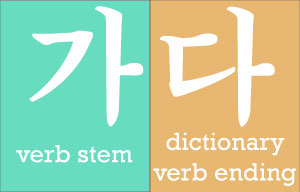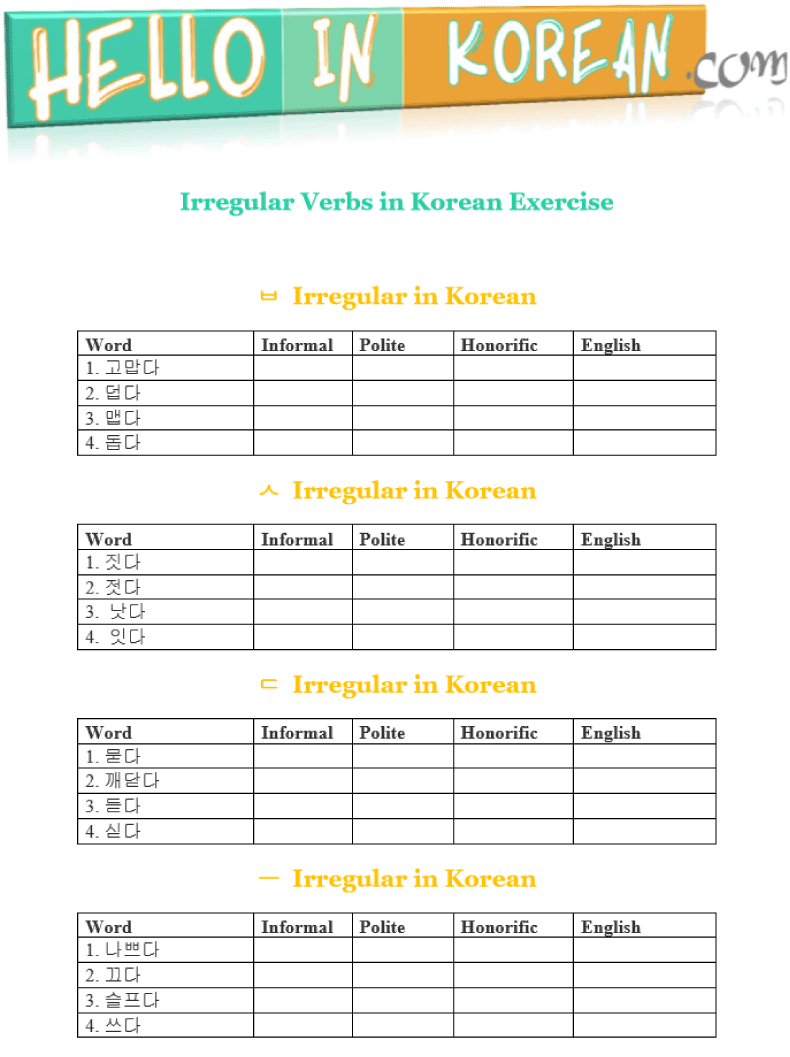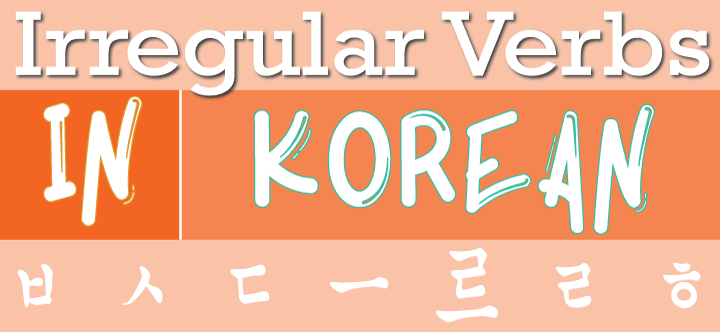How to Conjugate Irregular Verbs in Korean
This lesson will teach you how to conjugate irregular verbs in Korean. Irregulars are annoying but a part of life. Luckily, Korean irregulars follow a pattern.
All Korean verbs end in 다. Verbs usually are not used in this form and need to be conjugated. The 다 ending is dropped before conjugation.
You need to conjugate verbs based on Korean honorifics. Korean honorifics is a system in which speech changes based on the relationships between people speaking and who they are speaking about. People older than you or in a more senior position get the more honorific forms.
The 7 Irregular Verbs in Korean
Table of Contents
Click a link below to learn.
ㅂ ㅅ ㄷ ㅡ 르 ㄹ ㅎ
ㅂ Irregular in Korean
If
1. The last letter in a verb stem is ㅂ
2. You are adding a verb ending, suffix, that starts with a vowel.
Ex. (~어요, ~아요)
Then
1. Remove ㅂ
2. Add 우 or 오, almost always 우
3. Add your verb ending
Example verb 춥다 = cold
1. 춥 – ㅂ = 추
2. 추 + 우 = 추우
3. 추우 + 어요 = 추워요(present tense polite)
When adding a suffix that starts with a consonant, such as ~습니다, conjugate as normal.
Example:
춥다 = cold
춥 + 습니다 = 춥습니다
ㅂ Irregular Verbs in Korean
| Korean | Informal | Polite | Honorific | English |
| 고맙다 | 고마워 | 고마워요 | 고맙습니다 | thank you |
| 덥다 | 더워 | 더워요 | 덥습니다 | hot |
| 맵다 | 매워 | 매워요 | 맵습니다 | spicy |
| 쉽다 | 쉬워 | 쉬워요 | 쉽습니다 | easy |
| 어렵다 | 어려워 | 어려워요 | 어렵습니다 | difficult |
These two verb get 오 added instead of 우.
| Korean | Informal | Polite | Honorific | English |
| 돕다 | 도와 | 도와요 | 돕습니다 | help |
| 곱다 | 고와 | 고와요 | 곱습니다 | pretty |
Here is a list of verbs that do not follow the ㅂ irregular rule.
| Korean | Informal | Polite | Honorific | English |
| 잡다 | 잡아 | 잡아요 | 잡습니다 | catch |
| 입다 | 입어 | 입어요 | 입습니다 | wear |
| 넓다 | 넓어 | 넓어요 | 넓습니다 | wide |
| 좁다 | 좁아 | 좁아요 | 좁습니다 | narrow |
| 씹다 | 씹어 | 씹어요 | 씹습니다 | chew |
| 접다 | 접어 | 접어요 | 접습니다 | fold |
| 집다 | 집어 | 집어요 | 집습니다 | pick up |
| 업다 | 업어 | 업어요 | 업습니다 | carry on back |
| 뽑다 | 뽑아 | 뽑아요 | 뽑습니다 | extract |
ㅅ Irregular in Korean
If
1. The last letter in a verb stem is ㅅ
2. You are adding a verb ending, suffix, that starts with a vowel.
Ex. (~어요, ~아요)
Then
1. Remove ㅅ
2. Add your verb ending, but do not combine it with the verb stem.
Example verb 붓다 = swell
1. 붓 – ㅅ = 부
2. 부 + 어요 = 부어요(present tense polite)
When adding a suffix that starts with a consonant, such as ~습니다, conjugate as normal.
Example:
붓다 = swell
붓 + 습니다 = 붓습니다
ㅅ Irregular Verbs in Korean
| Korean | Informal | Polite | Honorific | English |
| 젓다 | 저어 | 저어요 | 젓습니다 | stir |
| 낫다 | 나아 | 나아요 | 낫습니다 | recover (from) |
| 짓다 | 지어 | 지어요 | 짓습니다 | build |
| 잇다 | 이어 | 이어요 | 잇습니다 | connect |
| 긋다 | 그어 | 그어요 | 긋습니다 | draw |
Here is a list of verbs that do not follow the ㅅ irregular rule.
| Korean | Informal | Polite | Honorific | English |
| 씻다 | 씻어 | 씻어요 | 씻습니다 | wash |
| 웃다 | 웃어 | 웃어요 | 웃습니다 | laugh |
| 벗다 | 벗어 | 벗어요 | 벗습니다 | take off |
| 빗다 | 빗어 | 빗어요 | 빗습니다 | comb |
| 빼앗다 | 빼앗아 | 빼앗아요 | 빼앗습니다 | take, steal |
ㄷ Irregular in Korean
If
1. The last letter in a verb stem is ㄷ
2. You are adding a verb ending, suffix, that starts with a vowel.
Ex. (~어요, ~아요)
Then
1. Remove ㄷ
2. Add ㄹ to the verb stem
3. Add your verb ending
Example verb 걷다 = walk
1. 걷 – ㄷ = 거
2. 거 + ㄹ = 걸
3. 걸 + 어요 = 걸어요(present tense polite)
When adding a suffix that starts with a consonant, such as ~습니다, conjugate as normal.
Example:
걷다 = cold
걷 + 습니다 = 걷습니다
ㄷ Irregular Verbs in Korean
| Korean | Informal | Polite | Honorific | English |
| 듣다 | 들어 | 들어요 | 듣습니다 | listen |
| 묻다 | 물어 | 물어요 | 묻습니다 | ask |
| 깨닫다 | 깨달아 | 깨달아요 | 깨닫습니다 | realize |
| 싣다 | 실어 | 실어요 | 싣습니다 | load |
Here is a list of verbs that do not follow the ㄷ irregular rule.
| Korean | Informal | Polite | Honorific | English |
| 닫다 | 닫아 | 닫아요 | 닫습니다 | close |
| 받다 | 받아 | 받아요 | 받습니다 | receive |
| 믿다 | 믿아 | 믿아요 | 믿습니다 | believe |
| 묻다 | 묻어 | 묻어요 | 묻습니다 | bury |
| 얻다 | 얻어 | 얻어요 | 얻습니다 | gain |
[mailmunch-form id=”333136″]
ㅡ Irregular in Korean
If
1. The last letter in a verb stem is ㅡ
2. You are adding a verb ending, suffix, that starts with a vowel.
Ex. (~어요, ~아요)
Then
1. Remove ㅡ
2. Add your verb ending
Here are three examples. Pay special attention to how they are conjugated differently.
♦ 아프다 = sick, hurts
1. 아프 – ㅡ = 아ㅍ
2. 아ㅍ + 아요 = 아파요(present tense polite)
The last vowel in 아ㅍ is ㅏ so the ~아요 ending is added.
♦ 예쁘다 = pretty
1. 예쁘 – ㅡ = 예ㅃ
2. 예ㅃ + 어요 = 예뻐요(present tense polite)
The last vowel in 예ㅃ is ㅖ so the ~어요 ending is added.
♦ 크다 = big
1. 크 – ㅡ = ㅋ
2. ㅋ + 어요 = 커요(present tense polite)
There is no last vowel in ㅋ so the ~어요 ending is added.
When adding a suffix that starts with a consonant, such as ~ㅂ니다, conjugate as normal.
Example:
아프다 = sick, hurts
아프 + ㅂ니다 = 아픕니다
ㅡ Irregular Verbs in Korean
| Korean | Informal | Polite | Honorific | English |
| 끄다 | 꺼 | 꺼요 | 끕니다 | turn off |
| 쓰다 | 써 | 써요 | 씁니다 | use, write |
| 기쁘다 | 기뻐 | 기뻐요 | 기쁩니다 | glad |
| 나쁘다 | 나빠 | 나빠요 | 나쁩니다 | bad |
| 슬프다 | 슬퍼 | 슬퍼요 | 슬픕니다 | sad |
르 Irregular in Korean
If
1. The last syllable in a verb stem is 르
2. You are adding a verb ending, suffix, that starts with ~어 or ~아
Then
1. Add a ㄹ to the syllable before 르
2. Remove ㅡ
3. Add your verb ending
Example verb 다르다 = different
1. 다르 + ㄹ = 달르
2. 달르 – ㅡ = 달ㄹ
3. 달ㄹ + 아요 = 달라요(present tense polite)
The honorific level of the 르 irregular is conjugated as normal.
Example:
다르다 = different
다르 + ㅂ니다 = 다릅니다
르 Irregular Verbs in Korean
| Korean | Informal | Polite | Honorific | English |
| 자르다 | 잘라 | 잘라요 | 자릅니다 | cut |
| 빠르다 | 빨라 | 빨라요 | 빠릅니다 | fast |
| 부르다 | 불러 | 불러요 | 부릅니다 | sing, call out |
| 고르다 | 골라 | 골라요 | 고릅니다 | choose |
| 모르다 | 몰라 | 몰라요 | 모릅니다 | not know |
The following verbs follow the ㅡ irregular rule, not the 르 irregular rule.
| Korean | Informal | Polite | Honorific | English |
| 따르다 | 따라 | 따라요 | 따릅니다 | follow |
| 다다르다 | 다다라 | 다다라요 | 다다릅니다 | arrive at |
| 치르다 | 치러 | 치러요 | 치릅니다 | pay off |
ㄹ Irregular in Korean
If
1. The last letter in a verb stem is ㄹ
2. You are adding a verb ending, suffix, that starts with ㅂ, ㄴ, or ㅅ
Then
1. Remove ㄹ
2. Add your verb ending
Example verb 열다 = open
1. 열 – ㄹ = 여
2. 여 + ㅂ니다 = 엽니다(present tense honorific)
1. 여 – ㄹ = 여
2. 여 + 는 = 여는(present tense adjective)
1. 여 – ㄹ = 여
2. 여 + ㄴ = 연(past tense adjective)
1. 여 – ㄹ = 여
2. 여 + 세요 = 여세요(imperative)
ㄹ Irregular Action Verbs in Korean
| Korean | Informal | Polite | Honorific | ㄴ | 는 | 세요 | English |
| 걸다 | 걸어 | 걸어요 | 겁니다 | 건 | 거는 | 거세요 | hang |
| 만들다 | 만들어 | 만들어요 | 만듭니다 | 만든 | 만드는 | 만드세요 | make |
| 놀다 | 놀아 | 놀아요 | 놉니다 | 논 | 노는 | 노세요 | play |
ㄹ Irregular Descriptive Verbs in Korean
| Korean | Informal | Polite | Honorific | ㄴ | 는 | 세요 | English |
| 달다 | 달아 | 달아요 | 답니다 | 단 | — | — | sweet |
| 질다 | 질어 | 질어요 | 집니다 | 진 | — | — | watery |
| 멀다 | 멀어 | 멀어요 | 멉니다 | 먼 | — | — | far |
Learn Korean Language Tips
Descriptive verbs do not use the 는 ending.
The 는 ending changes action verbs to present tense adjectives.
This is why descriptive verbs do not use 는.
The imperative ~세요 ending usually isn’t added to descriptive verbs because it is added to words like 만들다 “Make” or 하다 “Do.”
For example:
“Please make it sweet.” O
Not, “Please sweet it.” X
ㅎ Irregular in Korean
If
1. The last letter in a verb stem is ㅎ
2. You are adding a verb ending, suffix, that starts with a vowel.
Ex. (~어요, ~아요)
Then
1. Remove ㅎ
2. Remove the final vowel
3. Add ㅐ
*The verb 하얗다 gets ㅒ added in step 3.
Example verb 파랗다 = blue
1. 파랗 – ㅎ = 파라
2. 파라 – ㅏ = 파ㄹ
3. 파ㄹ + ㅐ = 파래(present tense informal)
When adding a suffix that starts with a consonant, such as ~습니다, conjugate as normal.
Example:
파랗다 = blue
파랗 + 습니다 = 파랗습니다
The ㅎ irregular rule applies to a few colors and demonstratives. The tables below show the most common ones.
ㅎ Irregular Verbs in Korean
Colors
| Korean | Informal | Polite | Honorific | English |
| 파랗다 | 파래 | 파래요 | 파랗습니다 | blue |
| 빨갛다 | 빨개 | 빨개요 | 빨갛습니다 | red |
| 노랗다 | 노래 | 노래요 | 노랗습니다 | yellow |
| 꺼맣다 | 까매 | 까매요 | 까맣습니다 | black |
| 하얗다 | 하얘 | 하얘요 | 하얗습니다 | white |
Demonstratives
| Korean | Informal | Polite | Honorific | English |
| 그렇다 | 그래 | 그래요 | 그렇습니다 | like that |
| 이렇다 | 이래 | 이래요 | 이렇습니다 | like this |
| 저렇다 | 저래 | 저래요 | 저렇습니다 | like that |
| 어떻다 | 어때 | 어때요 | 어떻습니다 | be how |
Here is a list of verbs that do not follow the ㅎ irregular rule.
| Korean | Informal | Polite | Honorific | English |
| 좋다 | 좋아 | 좋아요 | 좋습니다 | good |
| 넣다 | 넣어 | 넣어요 | 넣습니다 | insert |
| 놓다 | 놓아 | 놓아요 | 놓습니다 | place |
| 많다 | 많아 | 많아요 | 많습니다 | many |

Fill out the form below to download this 4 page exercise and answer key.
[mailmunch-form id=”333136″]


Leave a Reply
You must be logged in to post a comment.